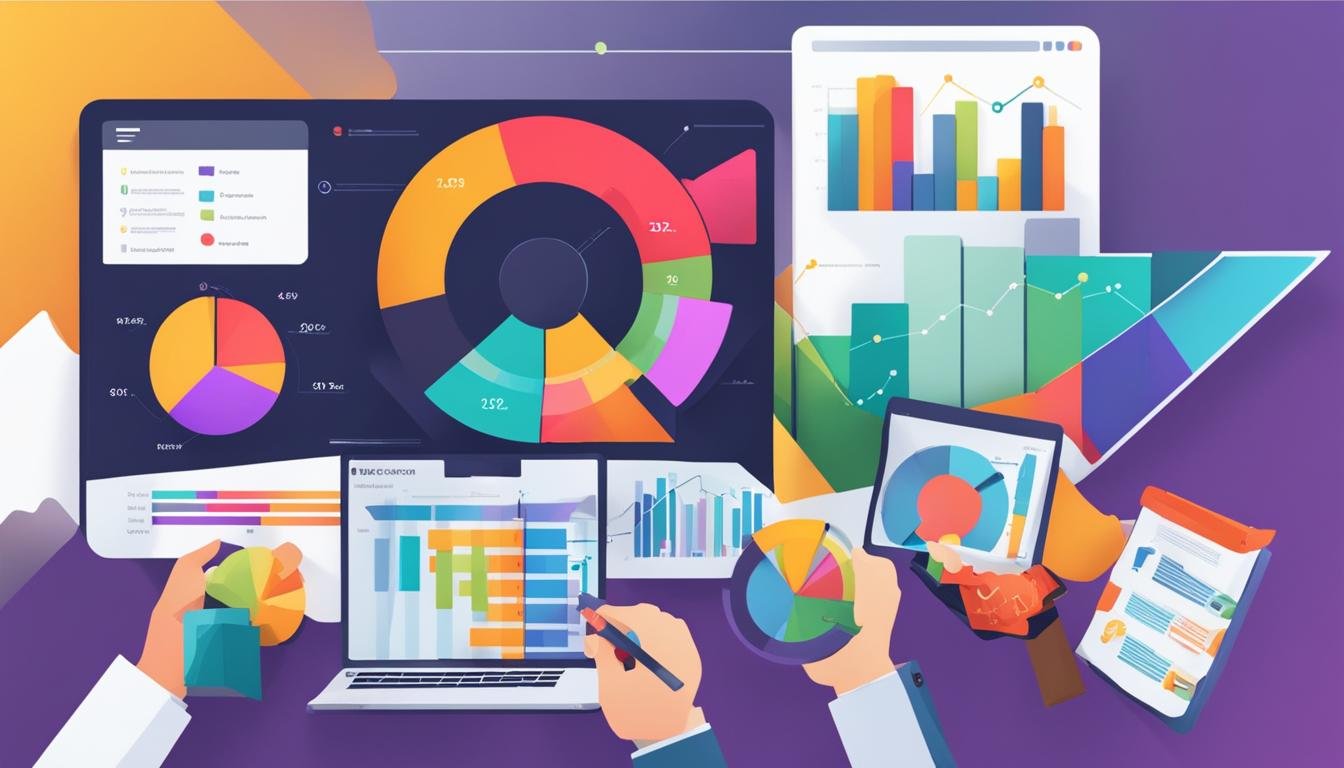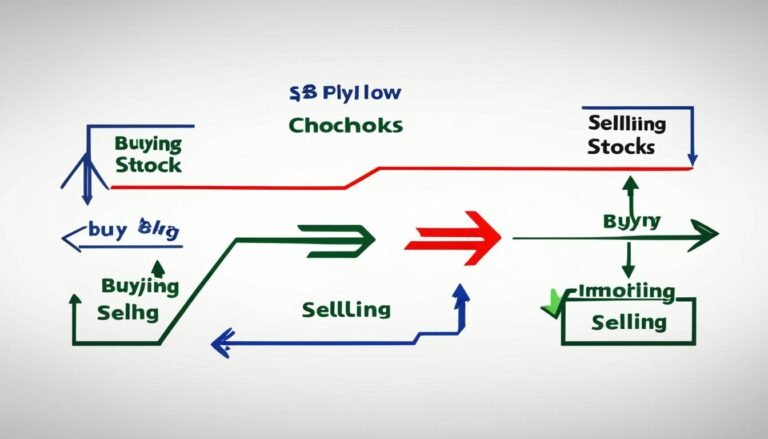Maximize Your Digital Marketing and ROI Strategies
As a digital marketer, you understand the importance of achieving a high return on investment (ROI) from your campaigns. Maximizing your ROI in digital marketing requires a strategic approach that combines effective strategies and accurate tracking methods. By implementing proven techniques, you can boost your ROI and drive revenue generation through your digital marketing efforts.
Effective digital marketing strategies play a crucial role in maximizing your ROI. It’s essential to identify the most impactful channels and tactics that resonate with your target audience. By tailoring your marketing messages and campaigns to meet their needs and interests, you can enhance engagement and conversion rates, ultimately increasing your ROI.
Tracking ROI in digital marketing is vital for evaluating the success of your campaigns. Accurate measurement allows you to assess the profitability of each initiative and make data-driven decisions to optimize future strategies. By utilizing reliable ROI metrics and benchmarking your performance, you can identify areas for improvement and refine your approach to drive better results.
Throughout this article, we will delve deeper into the strategies, metrics, and technologies that will help you maximize your digital marketing ROI. From proven methodologies to powerful tools, you’ll gain insights and practical tips to enhance your marketing efforts and achieve exceptional ROI-driven campaigns.
Key Takeaways
- Effective digital marketing strategies are essential for maximizing ROI
- Accurate tracking and measurement of ROI allow for data-driven decision making
- Identifying high-performing channels and tactics is key to boosting ROI
- Using relevant ROI metrics and benchmarking performance helps optimize strategies
- The right technology can streamline ROI measurement and enhance marketing efforts
How to Prove Social Media ROI
Proving Social Media ROI is a crucial step in optimizing your social media strategies and making data-driven decisions for your campaigns. By accurately measuring and tracking the effectiveness of your social media efforts, you can identify areas for improvement and maximize your ROI. Here are some key methods to prove the ROI of your social media campaigns:
Setting up Tools for ROI Measurement
To track and analyze the impact of your social media campaigns, it is essential to set up tools that measure ROI. One of the most popular tools is Google Analytics, which provides detailed insights into website traffic, conversions, and user behavior. By linking Google Analytics to your social media management platform, such as Agorapulse, you can attribute conversions and ROI to specific social media campaigns.
Utilizing Campaign-Tracking Tools
Campaign-tracking tools, such as UTM parameters, are effective for attributing conversions and ROI to specific campaigns. By adding unique UTM parameters to your social media links, you can track the performance of individual campaigns and measure their impact on ROI. These tools provide valuable data that helps you understand which social media tactics are driving the most significant returns.
Benchmarking Your Marketing ROI
Comparing the performance of your social media campaigns over time allows you to benchmark your marketing ROI. By analyzing the results of past campaigns and setting specific ROI goals, you can measure the progress and effectiveness of your social media strategies. Benchmarking helps you identify trends, make data-driven decisions, and optimize your future campaigns for improved ROI.
Demonstrating ROI from Social Media Campaigns
Proving the ROI from your social media campaigns requires presenting clear evidence of the financial impact they have generated. This can be done by quantifying the revenue or conversions directly attributed to your social media efforts. Creating reports and providing visual representations of the ROI achieved can help showcase the effectiveness of your social media strategies to key stakeholders.
By implementing these strategies and utilizing the right tools, you can effectively prove the ROI of your social media campaigns. This evidence-based approach not only enhances your decision-making processes but also supports the justification of your social media investment.
Remember, tracking and proving ROI is a continuous process that requires thorough analysis and optimization to maximize the return on your social media efforts.
| Social Media Metrics for ROI Measurement | Tracking Social Media ROI | Calculating Social Media ROI | Social Media ROI Tracking Tools |
|---|---|---|---|
|
|
|
|
Key Metrics for Measuring Digital Marketing ROI
When it comes to measuring digital marketing ROI, focusing on the right metrics is crucial. These metrics provide valuable insights into the effectiveness of your digital marketing efforts and help you make informed decisions to optimize your strategies.
Website Conversion Rate
The website conversion rate is a key metric for measuring digital marketing ROI. It measures the percentage of visitors who complete a desired action on your website, such as making a purchase, filling out a form, or subscribing to a newsletter. A high conversion rate indicates that your digital marketing efforts are effectively converting visitors into customers.
Cost per Conversion
Cost per conversion is another important metric to consider. It calculates the average cost to achieve a specific conversion. By tracking this metric, you can determine how efficiently you are converting leads into paying customers. Lowering your cost per conversion can help improve your digital marketing ROI.
Return on Ad Spend
Return on ad spend (ROAS) measures the revenue generated from your advertising campaigns relative to the amount spent on those campaigns. Monitoring ROAS allows you to evaluate the profitability of your ad campaigns and make data-driven decisions about future ad investments.
Customer Lifetime Value
Customer lifetime value (CLV) is the predicted net profit attributed to the entire future relationship with a customer. This metric helps you understand the long-term value each customer brings to your business. By maximizing CLV, you can increase your digital marketing ROI by focusing on retaining and nurturing valuable customers.
Customer Acquisition Cost
Customer acquisition cost (CAC) measures the average cost to acquire a new customer. By tracking CAC, you can evaluate the effectiveness of your customer acquisition strategies and identify areas for optimization. Lowering CAC can lead to improved digital marketing ROI.
Email Open Rate
Email open rate measures the percentage of recipients who open an email you sent them. It reflects the effectiveness of your email marketing campaigns in capturing attention and engaging your audience. Monitoring and improving email open rates can help enhance your digital marketing ROI.
Click-Through Rate
Click-through rate (CTR) measures the percentage of people who click on a link or ad displayed to them. It indicates the level of engagement and interest generated by your digital marketing campaigns. A higher CTR suggests that your marketing efforts are resonating with your audience and driving them to take action.
By tracking and analyzing these key metrics, you can gain valuable insights into the performance of your digital marketing strategies and make data-driven decisions to optimize your ROI.
Understanding Digital Marketing ROI and How to Calculate It
Understanding and calculating your digital marketing return on investment (ROI) is crucial for evaluating the effectiveness and profitability of your marketing efforts. By measuring the success of your marketing initiatives, you can ensure that your investments contribute to the growth of your business. Calculating ROI involves assessing the revenue generated from your marketing strategies and comparing it to your total marketing costs. This formula allows you to determine the profitability of your digital marketing efforts.
The Importance of Digital Marketing ROI
Digital marketing ROI serves as a key performance indicator for assessing the success of your marketing campaigns. It provides valuable insights into the financial impact of your initiatives and helps you make informed decisions for future strategies. By understanding your marketing ROI, you can justify your marketing investment to stakeholders and prioritize efforts that deliver the highest returns.
Measuring the Success of Digital Marketing
To measure the success of your digital marketing, it’s essential to track key metrics such as website traffic, conversions, and sales. By monitoring these metrics, you can evaluate the effectiveness of your marketing campaigns and identify areas for improvement. Utilizing analytics tools like Google Analytics allows you to gather data on customer behavior, conversion rates, and engagement metrics, providing valuable insights into the success of your digital marketing efforts.
Evaluating the Profitability of Digital Marketing
Calculating the profitability of your digital marketing efforts involves assessing the revenue generated from your marketing strategies and comparing it to your total marketing costs. This financial analysis helps you understand the financial impact of your marketing initiatives and determine their effectiveness in generating profits. Evaluating the profitability allows you to optimize your marketing strategies and allocate resources to the most profitable channels and campaigns.
| Benefits of Understanding Digital Marketing ROI |
|---|
| 1. Enables data-driven decision making |
| 2. Justifies marketing investment to stakeholders |
| 3. Identifies areas for improvement and optimization |
| 4. Helps allocate resources to the most profitable channels |
| 5. Provides insights into the effectiveness of marketing campaigns |
Understanding digital marketing ROI allows you to assess the success of your marketing campaigns, make informed decisions, and continuously improve your strategies. By tracking and evaluating the financial impact of your marketing initiatives, you can optimize your efforts and maximize the returns on your marketing investment.
Strategies to Improve ROI in Digital Marketing
Improving your ROI in digital marketing requires implementing effective strategies and optimizing key areas of your campaigns. By focusing on the right metrics, delivering high-value content, leveraging marketing automation technology, and making data-driven decisions, you can maximize your digital marketing ROI and drive profitability. Here are some strategies to help you enhance your digital marketing ROI:
- Monitor the Right ROI Metrics: Rather than getting distracted by vanity metrics, such as likes or shares, focus on metrics that directly impact your bottom line. Key metrics to monitor include conversion rate, cost per conversion, return on ad spend, customer lifetime value, email open rate, and click-through rate. By tracking and analyzing these metrics, you can align your efforts with the best-performing channels and optimize your campaigns for higher ROI.
- Identify Areas for Improvement: Regularly assess your campaign performance and identify underperforming metrics. Whether it’s a low conversion rate or high cost per conversion, evaluating your weak points will help you optimize your digital marketing strategies and boost your ROI. Keep experimenting with different approaches and tactics to find what works best for your target audience.
- Create Higher-Value Content: In a crowded digital landscape, delivering content that resonates with your audience and provides value is crucial. By producing high-quality, informative, and engaging content, you can enhance user experience, build trust with your audience, and increase the likelihood of conversions. Consider incorporating various types of content, such as blog posts, videos, webinars, and infographics, to diversify your content strategy and attract wider audience attention.
- Utilize Marketing Automation Technology: Implementing marketing automation tools can significantly improve your efficiency and ROI. These tools streamline processes, automate repetitive tasks, and provide valuable insights into your campaigns. By automating email marketing, lead nurturing, and customer relationship management, you can optimize your workflows, save time, and focus on higher-value activities.
- Analyze and Optimize Based on Data: Gather and analyze data from your digital marketing campaigns to identify patterns, trends, and areas for improvement. Leverage the insights gained from data analysis to make informed decisions and optimize your strategies. Regularly test different variables, such as ad copy, landing page design, and targeting parameters, to identify the most effective combinations and continuously improve your ROI.
By implementing these strategies, you can enhance your digital marketing ROI, drive profitability, and achieve greater success in reaching your marketing goals.
The Significance of Tracking ROI in Marketing Efforts
Tracking ROI in marketing efforts plays a crucial role in evaluating the efficacy and success of your marketing campaigns. It allows you to determine the financial impact of your marketing initiatives and make data-driven decisions to optimize your strategies. By tracking ROI, you can identify the marketing tactics that generate the most significant returns and allocate your resources more efficiently.
One of the key benefits of tracking ROI is its ability to help you justify your marketing investment to stakeholders. By presenting measurable results and insights, you can demonstrate the effectiveness of your marketing efforts and gain support for future campaigns.
Proper measurement of marketing effectiveness through ROI tracking enables you to optimize your marketing efforts based on actionable data. It provides insights into which strategies are driving the most value and which need to be refined or eliminated. By continuously analyzing and optimizing your campaigns, you can ensure that your marketing initiatives align with your business objectives and generate the desired results.
“Tracking ROI in marketing efforts allows you to determine the financial impact of your marketing initiatives and make data-driven decisions.”
Technology for Measuring and Increasing Marketing ROI
One of the top technologies for measuring and increasing marketing ROI is MarketingCloudFX. With its advanced analytics and tracking capabilities, MarketingCloudFX allows you to accurately assess the effects of your marketing efforts. By utilizing marketing automation tools, you can streamline your marketing processes, save time, and maximize your ROI. These tools can handle repetitive tasks, analyze data, and help you optimize your campaigns for better results. Furthermore, leveraging analytics tools enables you to track and measure the ROI of your marketing initiatives, providing valuable insights into their profitability and effectiveness.
To illustrate the importance of technology in measuring and increasing marketing ROI, consider the following:
- Accurate Assessment: MarketingCloudFX provides detailed analytics that help you understand the impact of your marketing efforts, allowing you to make data-driven decisions.
- Streamlined Processes: By utilizing marketing automation tools, you can automate tasks, such as email marketing campaigns and social media scheduling, freeing up time to focus on other critical aspects of your marketing strategy.
- Optimized Campaigns: With the help of automation tools, you can analyze data, identify trends and patterns, and optimize your marketing campaigns to drive better results and maximize your ROI.
Investing in technology for measuring and increasing marketing ROI is crucial for staying competitive in the digital landscape. It allows you to leverage data-driven insights, streamline your marketing processes, and make informed decisions to enhance the effectiveness and profitability of your marketing efforts.
Comparison of Marketing ROI Tracking Solutions
| Marketing ROI Tracking Solution | Key Features |
|---|---|
| MarketingCloudFX |
|
| Google Analytics |
|
| HubSpot |
|
When choosing a marketing ROI tracking solution, consider your specific needs and goals. While MarketingCloudFX offers advanced analytics and marketing automation capabilities, Google Analytics provides comprehensive website analytics, and HubSpot combines marketing automation with CRM integration. Evaluating the features and benefits of each solution will help you find the one that best suits your business requirements.
By implementing the right technology for measuring and increasing marketing ROI, you can gain valuable insights into the effectiveness of your marketing efforts and optimize your strategies for maximum profitability.
Conclusion
In conclusion, successfully maximizing your digital marketing and ROI strategies requires a comprehensive approach. By accurately measuring and tracking ROI, setting specific goals, and focusing on high-performing channels, you can optimize your campaigns and drive better results. It’s important to analyze and optimize your digital marketing efforts based on relevant metrics to ensure you are making data-driven decisions. Additionally, leveraging technology such as marketing automation and analytics tools can provide valuable insights and help you track and increase your ROI.
Remember, tracking ROI is essential for continuously improving your marketing strategies. By running experiments, refining your tactics, and adapting to the ever-changing digital landscape, you can enhance the effectiveness and profitability of your digital marketing initiatives. Implementing these strategies and continually optimizing your approach will allow you to stay ahead of the competition and achieve maximum ROI from your digital marketing efforts.
Summarizing digital marketing ROI strategies, it is crucial to measure and track ROI correctly, focus on high-performing channels, and utilize technology to enhance your effectiveness and profitability. With a data-driven and comprehensive approach, you can continuously improve your marketing strategies and achieve a higher ROI in the digital marketing landscape.







